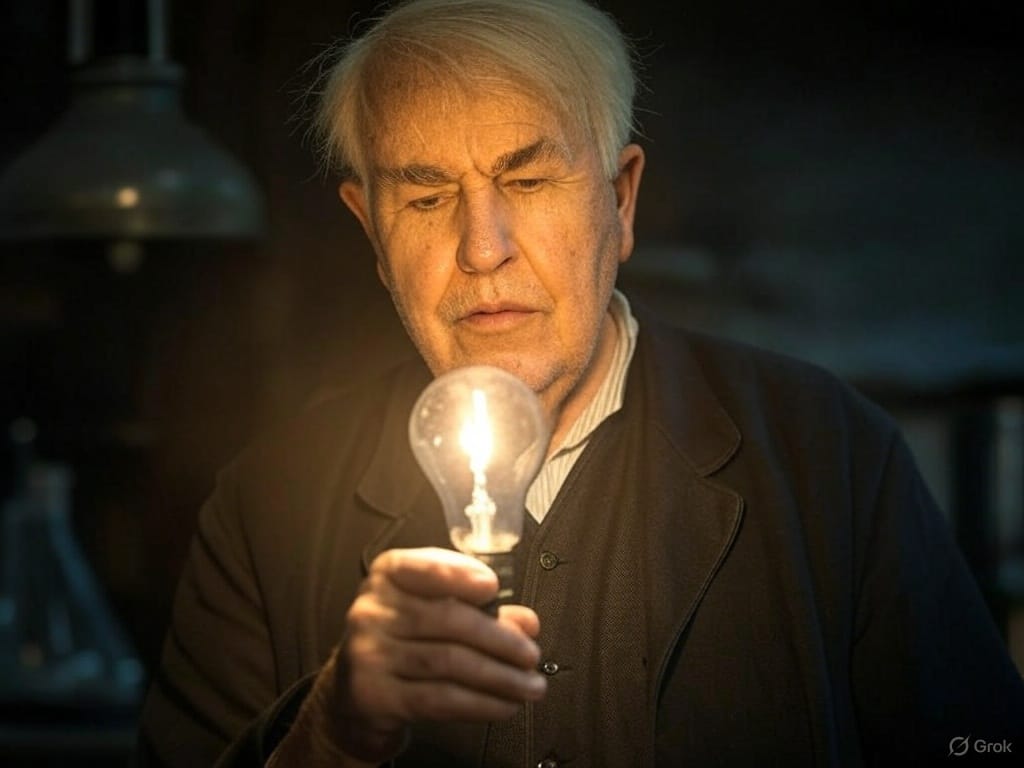Why Brilliant Business Ideas Usually Fail
You don’t succeed by just being first or by making something technically better —you win by solving the right problem in the right way.
Most likely, you have a brilliant idea burning in your mind... maybe it's the next game-changing app, a revolutionary service, or an innovative product.
But something's holding you back...
That gap between vision and reality feels wide and virtually impossible.
Having spent the last three decades starting businesses and mentoring multiple startup founders, I've seen and experienced this paralysis firsthand.
After studying entrepreneurial success stories and examining historical innovation patterns — like those highlighted in the Harvard Business Review 2023 and the Smithsonian Institution 2024 — I've observed some fascinating insights that challenge the usual thinking about timing and achieving market success.
Let me share a story that might just change how you think about entrepreneurial success.
When Being First Isn't Enough
In 1807, at a groundbreaking demonstration at the Royal Institution, chemist Humphry Davy created something extraordinary.
According to the Institution’s historical archives (Royal Society, 1807), he used a battery of 2,000 cells to produce what he called "artificial lightning"— the world’s first lamp.
Interestingly, this happened decades before Thomas Edison was even born.
Despite this revolutionary discovery, Davy’s breakthrough remained stuck in theory.
A study by Strategic Management Insight (2024) found that first-movers have a 47% failure rate and an average market share of only 10%.

Edison understood something that countless entrepreneurs still struggle with today: being first doesn’t matter nearly as much as being effective (Harvard Business Review, 2023).
The Real Secret to Market Success
Edison’s real innovation wasn’t just the light bulb — it was his entire ecosystem.
His work on the practical incandescent bulb (1879) and the Pearl Street Station power distribution system (1882) led to the world’s first complete electrical network (U.S. Patent Office, 1880s).
His systematic approach resulted in 1,093 patents and the creation of General Electric (NYSE: GE), which remains a Fortune 500 company today (McKinsey, 2024).
Today, the same principle holds. McKinsey’s 2024 Technology Trends Outlook emphasizes that successful innovation requires comprehensive ecosystems, not just standalone solutions.
I learned this the hard way with one of my first startups, which I started in 2004. We developed an innovative pavement solution, but I spent six months perfecting the formula while ignoring potential clients and key partnerships.
The result? It was a technically "extraordinary" product that was way ahead of its time, yet very few could actually use it in real-world conditions.

Beyond the Brilliant Idea
Your journey isn’t about having the most innovative idea but about being persistent enough to overcome every problem that stands between your idea and its successful implementation.
This means:
✔️ Handling mundane logistics beneath your vision
✔️ Building systems that aren’t as exciting as your core idea
✔️ Tackling those problems that aren't exciting but are truly important.
✔️ Persisting when others would have considered the project "good enough"
love to share the story of AirBnb:
In their early days, the founders—Brian Chesky, Joe Gebbia, and Nathan Blecharczyk—struggled to gain traction. They had built the platform, but bookings weren’t coming in like they had hoped. Instead of sitting back and waiting, Brian and Joe took a scrappy, hands-on approach: They started visiting hosts in New York City.
At the time, most of Airbnb’s listings were in NYC, but the photos were terrible—dimly lit, cluttered, and uninviting. So Brian and Joe flew out from San Francisco, camera in hand, and went door-to-door, meeting hosts and helping them take professional-looking photos.
They also took the time to talk to these early users, understanding their concerns, pain points, and what would make them feel comfortable renting out their space to strangers. This direct feedback became a goldmine, helping them refine Airbnb’s messaging and product features.
One of the biggest lessons they learned? Trust was everything. People were hesitant to let strangers into their homes, so Airbnb needed to focus on building credibility. These early conversations led to reviews, identity verification, and host guarantees.
This hands-on hustle gave the founders insights that shaped Airbnb into what it is today. Instead of relying solely on digital marketing or growth hacks, they physically embedded themselves in their users’ world—proving that the best way to succeed in a startup is to start small, listen, and improve based on real human needs.
The Edison Principle
Success in entrepreneurship follows what I call the Edison Principle: It’s not about being first; it's about being mindful of our actions.
Key Takeaway:
- Davy sparked the idea, but Edison lit the world.
- History doesn’t remember who had the idea first — it remembers who made it happen.
Your brilliant idea is just the beginning. The real work, the work that matters, is in the relentless pursuit of making it practical, possible, and profitable. That’s what separates the dreamers from the doers.
The next time you hesitate to move forward because conditions aren’t perfect, remember: Perfection isn’t the goal. Progress is.
Start building today.
#BeBusinessSmart
References
- Harvard Business Review. (2023). "What Entrepreneurs Can Learn from Edison’s Systematic Approach to Innovation." https://hbr.org/
- Smithsonian Institution. (2024). "The Forgotten Genius: Humphry Davy and Early Electrical Experiments." https://www.si.edu/
- Royal Society Publishing. (1807). "Humphry Davy’s Discovery of the Arc Lamp." https://royalsocietypublishing.org/
- U.S. Patent Office. (1880s). "Thomas Edison's Patents and the Evolution of Electrical Systems." https://www.uspto.gov/
- Strategic Management Insight. (2024). "Why First Movers Often Lose: A Data-Driven Analysis." (Find a credible link or report)
- McKinsey & Company. (2024). "Technology Trends Outlook: Ecosystem Innovation Over First-Mover Advantage." https://www.mckinsey.com/
- Grand View Research. (2024). "Global Innovation Management Market Growth (2024-2030)." https://www.grandviewresearch.com/
- Y Combinator. (2024). "The Traits of Startups That Succeed." https://www.ycombinator.com/
- Startup Genome. (2024). "The Startup Success Rate Report." https://startupgenome.com/
- CB Insights. (2024). "The Top Reasons Startups Fail in 2024." https://www.cbinsights.com/research/startup-failure-reasons/

